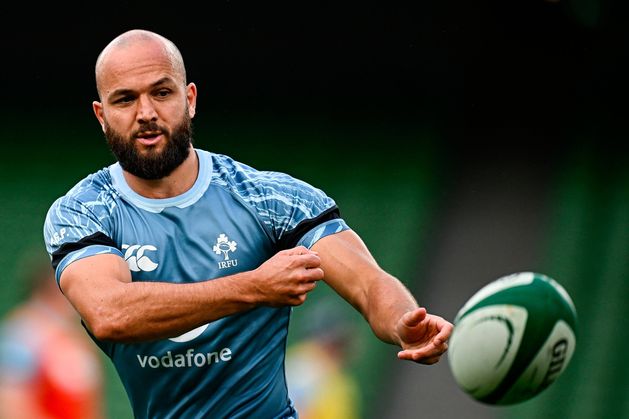
[ad_1]
Borthwick’s side have been beaten narrowly by New Zealand and Australia in their first two games in November and now face the world champion Springboks hoping to salvage their autumn.
A theme of the two defeats has been the outsized impact of a crackdown on what is known as “escorting”. Referees have placed an emphasis on ensuring that retreating players do not block chasers from challenging for high kicks, with the goal of increasing the regularity of aerial contests.
England and other sides have been penalised repeatedly by the officials for falling foul of this crackdown, while it has also made the game messier, with knock-ons becoming regular with chasing players given unimpeded access to the catching player.
Ireland scrum-half Jamison Gibson-Park was penalised during last Friday’s clash with New Zealand for ‘denying the aerial contest’.
“I think the game has changed in the last two weeks,” senior assistant coach Richard Wigglesworth explained ahead of England’s clash with the Springboks. “I’m not sure it was intentional. I think they’ve tried to fix something, [but] they’re going to create a lot of contestable kicking, that’s for sure. I’m not sure that was the intention.
“There is zero doubt it’s going to lead to more kicking. I think the intentions were good on it, I do. But I’m not sure it will have the desired effect of wanting clean contests, because a clean contest is two guys trying to catch a ball. Kick execution is now a big part of the game. We’re playing a team at the weekend who are very good at that, so we’re going to have to handle that really well.”
England had been among the best sides at “escorting” prior to the law tweak, affording protection to dynamic backfield counter-attackers like George Furbank and Immanuel Feyi-Waboso to provide them with space from which to launch.
“It’s a big adaptation because we’ve been using blockers our whole careers, really, so it’s trying to adapt to that,” Ollie Sleightholme, the England wing, explained.
“It’s just going to be a case of how quickly we can adapt to that law change and how quickly we can learn. A lot of teams, with the law changes, are now going to a contestable game.”
With teams now moving towards shorter, more contestable kicks, those strengths would appear to be less desirable – potentially working in the favour of an elite aerial operator like Freddie Steward.
The full-back had been a figure of permanence in the England starting side since his debut in 2021 prior to the Six Nations, when he was usurped by Furbank as Borthwick sought to add extra attacking verve and defensive covering speed to his side.
But with his ability under the high ball both vital defensively and a potential attacking weapon, England could consider Steward for a role in the match-day 23.
“It plays into the hands of anyone with good aerial skills,” Wigglesworth said. “We have got Tommy Freeman who is exceptional in the air. You’ve seen Manny [Feyi-Waboso] get a couple of balls back where he’s actually caught it, which is an exceptional skill in itself.
“It’s something we asked all our back-three guys to have, before this rule came in. Now it’s become more important but what that area looks like and how unstructured it is around there has definitely changed.”
Feyi-Waboso will miss the fixture against South Africa while progressing through the head injury return to play protocols, but Freeman looks set to retain his place – in the Premiership last season, no player over-performed their expected catch rate more significantly than Freeman, who caught nearly 20pc more high balls than expected.
That prowess was utilised to excellent effect at Eden Park in July, when the Northampton Saint soared over New Zealand’s Mark Tele’a to score on the stroke of half-time.
England need only to look at their performance in the World Cup semi-final against the Springboks to show that a well-executed kick strategy can keep them in the fight. Before a final quarter collapse at scrum-time, Borthwick’s side were in control with Alex Mitchell and Owen Farrell kicking superbly for the back-three of Steward, Elliot Daly and Jonny May to chase.
While neither Mitchell, who has a neck injury, nor Farrell, now playing in France, is available this weekend, Ben Spencer is regarded as an outstanding box kicker and an increased role for George Ford – however well Marcus Smith has been going in an attacking sense – would be a hint that England might be returning to that sort of game-plan.
They will be careful, though, to avoid increasing the number of scrums in the game, given the strength of South Africa and relative weakness of England at the set-piece.
“Balance would be the right word,” Wigglesworth explained of how England’s approach may look. “When you’re playing the double world champions, they’re obviously good at putting opposition under pressure.
“If you just decide you’re going to try and do what you want to do, they’re probably the best at taking that stuff away from you because of what they’ve got. We’ve made sure we’ve taken bits from that [semi-final] where we did put them under pressure.
“But, conversely, why didn’t we win that day? What didn’t we execute? We’ll hopefully marry the two up to get a good balance at the weekend.”
[ad_2]
Copyright for syndicated content belongs to the linked Source link


